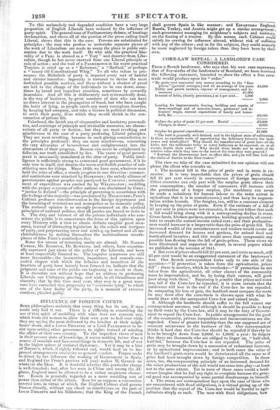INFLUENCE OF FOREIGN COURTS.
SOME philosophers maintain that every thing has its use, if men could only find it out. There is a difficulty in conceiving the use of that spirit of meddling with what does not concern one, which leads old women to allow their own pots to boil over while they are spying the meat delivered by the butcher at their neigh- bours doors, and a Louis PHILIPPE or a Lord PALMERSTON to in- sist upon setting other governments to rights instead of minding the affairs of their own country. To the imperfect views of men in their present state of knowledge, it seems nothing better than a source of scandals and face-scratchings in domestic life, and of war in the higher sphere of national diplomacy. Yet it may be a hint of Nature's, which, if rightly followed out, would lead us to im- proved arrangements conducive to general comfort. France seeks to direct by her influence the working of Government in Spain, and England (so French patriots tell you) makes M. GUIZOT do whatever she likes. It is doubtful whether this particular charge is well-founded; but, after her wars in China and among the Af- ghans, England must be allowed to be a rather suspicious charac- ter. Russia is generally regarded as a more meddling sort of power than either of the others. Now let us suppose a convention entered into, in virtue of which, the English Cabinet shall govern France directly, without any check or interference on the part of Louis PnuareE and his Ministers; that the King of the French
shall govern Spain in like manner; and ESPARTERO England. Russia, Turkey, and Austria might get up a similar arrangement ; each government managing its neighbour's subjects and territory, on the footing of a trustee. By this means, each Cabinet could satisfy its craving for influence abroad, without risk of collision with any of the others ; and as for the subjects, they could scarcely be more neglected by foreign rulers than they have been by their own.






















 Previous page
Previous page